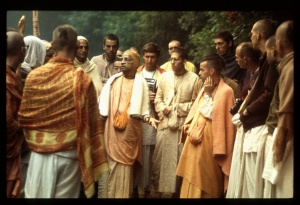CC Madhya 8.230: Difference between revisions
m (1 revision(s)) |
(Vanibot #0054 edit - transform synonyms into clickable links, which search similar occurrences) |
||
| (One intermediate revision by one other user not shown) | |||
| Line 1: | Line 1: | ||
{{ | [[Category:Sri Caitanya-caritamrta - Madhya-lila Chapter 08|C230]] | ||
<div style="float:left">'''[[Sri Caitanya-caritamrta|Śrī Caitanya-caritāmṛta]] - [[CC Madhya|Madhya-līlā]] - [[CC Madhya 8|Chapter 8: Talks Between Śrī Caitanya Mahāprabhu and Rāmānanda Rāya]]'''</div> | |||
<div style="float:right">[[File:Go-previous.png|link=CC Madhya 8.229|Madhya-līlā 8.229]] '''[[CC Madhya 8.229|Madhya-līlā 8.229]] - [[CC Madhya 8.231|Madhya-līlā 8.231]]''' [[File:Go-next.png|link=CC Madhya 8.231|Madhya-līlā 8.231]]</div> | |||
{{CompareVersions|CC|Madhya 8.230|CC 1975|CC 1996}} | |||
{{RandomImage}} | |||
==== TEXT 230 ==== | ==== TEXT 230 ==== | ||
<div | <div class="verse"> | ||
gopī-ānugatya vinā aiśvarya-jñāne | :gopī-ānugatya vinā aiśvarya-jñāne | ||
bhajileha nāhi pāya vrajendra-nandane | :bhajileha nāhi pāya vrajendra-nandane | ||
</div> | </div> | ||
| Line 12: | Line 16: | ||
==== SYNONYMS ==== | ==== SYNONYMS ==== | ||
<div | <div class="synonyms"> | ||
gopī- | ''[//vanipedia.org/wiki/Special:VaniSearch?s=gopī&tab=syno_o&ds=1 gopī]-[//vanipedia.org/wiki/Special:VaniSearch?s=ānugatya&tab=syno_o&ds=1 ānugatya]'' — subservience to the ''gopīs''; ''[//vanipedia.org/wiki/Special:VaniSearch?s=vinā&tab=syno_o&ds=1 vinā]'' — without; ''[//vanipedia.org/wiki/Special:VaniSearch?s=aiśvarya&tab=syno_o&ds=1 aiśvarya]-[//vanipedia.org/wiki/Special:VaniSearch?s=jñāne&tab=syno_o&ds=1 jñāne]'' — in the knowledge of opulence; ''[//vanipedia.org/wiki/Special:VaniSearch?s=bhajileha&tab=syno_o&ds=1 bhajileha]'' — if serving the Supreme Lord; ''[//vanipedia.org/wiki/Special:VaniSearch?s=nāhi&tab=syno_o&ds=1 nāhi]'' — not; ''[//vanipedia.org/wiki/Special:VaniSearch?s=pāya&tab=syno_o&ds=1 pāya]'' — gets; ''[//vanipedia.org/wiki/Special:VaniSearch?s=vrajendra&tab=syno_o&ds=1 vrajendra]-[//vanipedia.org/wiki/Special:VaniSearch?s=nandane&tab=syno_o&ds=1 nandane]'' — the son of Mahārāja Nanda, Kṛṣṇa. | ||
</div> | </div> | ||
| Line 19: | Line 23: | ||
==== TRANSLATION ==== | ==== TRANSLATION ==== | ||
<div | <div class="translation"> | ||
“Unless one follows in the footsteps of the gopīs, he cannot attain the service of the lotus feet of Kṛṣṇa, the son of Nanda Mahārāja. If one is overcome by knowledge of the Lord’s opulence, he cannot attain the Lord’s lotus feet, even though he is engaged in devotional service. | “Unless one follows in the footsteps of the gopīs, he cannot attain the service of the lotus feet of Kṛṣṇa, the son of Nanda Mahārāja. If one is overcome by knowledge of the Lord’s opulence, he cannot attain the Lord’s lotus feet, even though he is engaged in devotional service. | ||
</div> | </div> | ||
| Line 26: | Line 30: | ||
==== PURPORT ==== | ==== PURPORT ==== | ||
<div | <div class="purport"> | ||
One can worship Lakṣmī-Nārāyaṇa by the process of vidhi-mārga, worshiping the Lord with regulative principles according to the instructions of the śāstra and the spiritual master. But the Supreme Personality of Godhead, Rādhā-Kṛṣṇa, cannot be directly worshiped by this process. The dealings between Rādhā and Kṛṣṇa and the gopīs are devoid of the opulences of Lakṣmī-Nārāyaṇa. The process of vidhi-mārga, following the regulative principles, is utilized in the worship of Lakṣmī-Nārāyaṇa, whereas the process of spontaneous service—following in the footsteps of the gopīs, who are the denizens of Vṛndāvana—is transcendentally more advanced and is the process whereby Rādhā and Kṛṣṇa are worshiped. One cannot attain this elevated position while worshiping the Lord in His opulence. Those attracted by the conjugal love between Rādhā and Kṛṣṇa must follow in the footsteps of the gopīs. Only then is it possible to enter into the Lord’s service in Goloka Vṛndāvana and directly associate with Rādhā and Kṛṣṇa. | One can worship Lakṣmī-Nārāyaṇa by the process of ''vidhi-mārga'', worshiping the Lord with regulative principles according to the instructions of the ''śāstra'' and the spiritual master. But the Supreme Personality of Godhead, Rādhā-Kṛṣṇa, cannot be directly worshiped by this process. The dealings between Rādhā and Kṛṣṇa and the ''gopīs'' are devoid of the opulences of Lakṣmī-Nārāyaṇa. The process of ''vidhi-mārga'', following the regulative principles, is utilized in the worship of Lakṣmī-Nārāyaṇa, whereas the process of spontaneous service—following in the footsteps of the ''gopīs'', who are the denizens of Vṛndāvana—is transcendentally more advanced and is the process whereby Rādhā and Kṛṣṇa are worshiped. One cannot attain this elevated position while worshiping the Lord in His opulence. Those attracted by the conjugal love between Rādhā and Kṛṣṇa must follow in the footsteps of the ''gopīs''. Only then is it possible to enter into the Lord’s service in Goloka Vṛndāvana and directly associate with Rādhā and Kṛṣṇa. | ||
</div> | </div> | ||
__NOTOC__ | |||
<div style="float:right; clear:both;">[[File:Go-previous.png|link=CC Madhya 8.229|Madhya-līlā 8.229]] '''[[CC Madhya 8.229|Madhya-līlā 8.229]] - [[CC Madhya 8.231|Madhya-līlā 8.231]]''' [[File:Go-next.png|link=CC Madhya 8.231|Madhya-līlā 8.231]]</div> | |||
__NOTOC__ | |||
__NOEDITSECTION__ | |||
Latest revision as of 23:56, 19 February 2024

A.C. Bhaktivedanta Swami Prabhupada
TEXT 230
- gopī-ānugatya vinā aiśvarya-jñāne
- bhajileha nāhi pāya vrajendra-nandane
SYNONYMS
gopī-ānugatya — subservience to the gopīs; vinā — without; aiśvarya-jñāne — in the knowledge of opulence; bhajileha — if serving the Supreme Lord; nāhi — not; pāya — gets; vrajendra-nandane — the son of Mahārāja Nanda, Kṛṣṇa.
TRANSLATION
“Unless one follows in the footsteps of the gopīs, he cannot attain the service of the lotus feet of Kṛṣṇa, the son of Nanda Mahārāja. If one is overcome by knowledge of the Lord’s opulence, he cannot attain the Lord’s lotus feet, even though he is engaged in devotional service.
PURPORT
One can worship Lakṣmī-Nārāyaṇa by the process of vidhi-mārga, worshiping the Lord with regulative principles according to the instructions of the śāstra and the spiritual master. But the Supreme Personality of Godhead, Rādhā-Kṛṣṇa, cannot be directly worshiped by this process. The dealings between Rādhā and Kṛṣṇa and the gopīs are devoid of the opulences of Lakṣmī-Nārāyaṇa. The process of vidhi-mārga, following the regulative principles, is utilized in the worship of Lakṣmī-Nārāyaṇa, whereas the process of spontaneous service—following in the footsteps of the gopīs, who are the denizens of Vṛndāvana—is transcendentally more advanced and is the process whereby Rādhā and Kṛṣṇa are worshiped. One cannot attain this elevated position while worshiping the Lord in His opulence. Those attracted by the conjugal love between Rādhā and Kṛṣṇa must follow in the footsteps of the gopīs. Only then is it possible to enter into the Lord’s service in Goloka Vṛndāvana and directly associate with Rādhā and Kṛṣṇa.